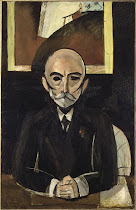So far, Jonathan Glover's Humanity has inspired me to think about morality (an excellent book recommendation from Ashleigh and Brian).
I'm halfway through the book and, secretly, I enjoy it because it makes me feel smart. I have a background in everything discussed. I recommend this book as a concise yet detailed summary of modern world history. These are the events that are worth thinking about (The World Wars, Stalin's Soviet Union, Vietnam and the My Lai massacre, the Rwanadan genocide, the disintegration of Yugoslavia, and other definitive atrocities of the 20th Century).
I keep expecting Glover to make his move and explain how we can restore a strong moral identity in our culture. He certainly admires individuals who stand against the current (those who opposed civilian bombing, fighting in war, etc). The whole book is presented as an answer to Nietzsche who foresaw that trust in God was declining and that we should admit there is no moral standard.
A Quick History of "The Moral Project" in Europe
Phase I. Obey God because He is Truth.
Phase II. Use our rationality to discover God's Truth.
Phase III. There's no truth. Do what you want.
For instance: let's look at what prevents us from taking candy from a child.
Phase I. Good people don't steal. Besides, God would see it and send me to hell.
Phase II. Good people don't steal. Think rationally: would I want to live in a society where everyone stole all of the time?
Phase III. I might get caught.
In the modern shift (Phase III) we have less of an objective sense of what a good person is. Thus, we don't often take principled stances. A principled stance is when you stand up for something because you have a definite rule of what it should be (as opposed to a changing opinion). It might seem worth arguing how we can define, for everyone, what a good person is. But that approach is only useful if it comes from a universally accepted source. And no one agrees on what the source should be (God doesn't do it for some, rationality doesn't do it for others). That's where we're at.
I propose a different way to look at morality.
Friday, December 5, 2008
Subscribe to:
Post Comments (Atom)





3 comments:
Even people who are fairly aspiritual (is that a word?) often seem to have this sense of 'karmic balance' that shapes their behaviors. I think this is, in many ways, very similar to your Phase I.
"I shouldn't steal candy from children, because then something bad might happen to ME."
I think that for a lot of people-- even those who are not religious in the traditional sense-- are guided more by this general feeling of "what goes around comes around" than by a fear of getting caught or even the fear of going to hell. It's not that we don't fear getting caught, it's just that THAT isn't the reason we try to be 'good' people.
This still doesn't explain exactly how we define "good" but, for me, it's mostly defined by that Kantian view (it is Kant, right?) that you mentioned. "Would I want to live in a society where everyone did this all the time?"
Not sure how coherent this comment was, ha.
An interesting thought. Kant's fun but when I do something good it's because it makes me feel good to think of myself in that kind of way.
To be honest, I consider most of my moral decisions in this manner: 'if this were a movie, am I being a character that I would cheer for?'
Yesterday's dino comic reminded me of this post.
Post a Comment